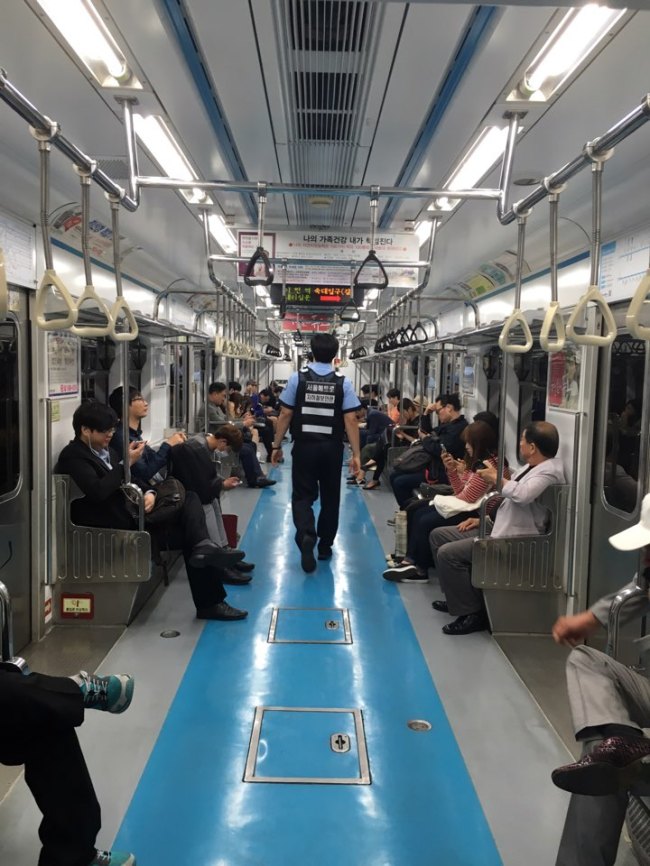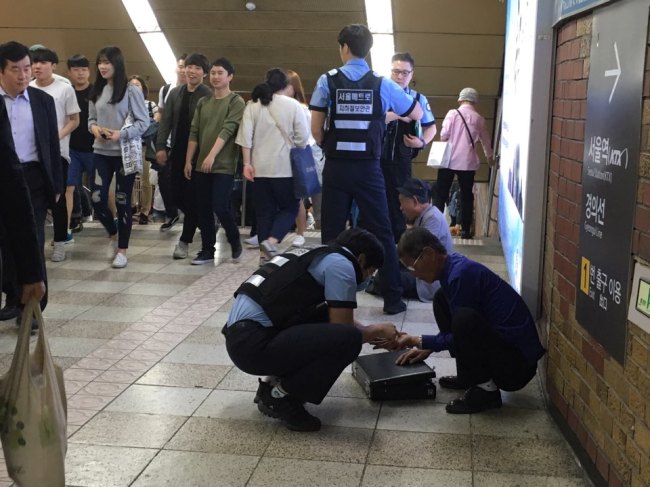Wearing stab-proof vests over their uniform shirt, they patrol underground during duty hours. Their mission is to help secure safety of people and keep peace.
Policemen? No, they are Subway Guards helping prevent crimes and incidents and establish order at more than 300 subway stations in Seoul.
Policemen? No, they are Subway Guards helping prevent crimes and incidents and establish order at more than 300 subway stations in Seoul.

As Seoul’s metro system transports more than 7.5 million commuters a day, more and more security-related violations are taking place at subway stations or inside rolling stocks.
It is against this backdrop that the Seoul Metropolitan Government introduced the subway guard system in 2011 to deal with security problems.
“We take preventive actions to protect people from possible threats from drunken passengers and homeless people, and to prevent sexual crimes,” Subway Guard Lee Kun-young told The Korea Herald. Lee, 43, became a guard five years ago and is responsible for Line No. 4.
In Seoul, nine subway lines are run by three operators -- Seoul Metro, Seoul Metropolitan Rapid Transit and Metro9.
Seoul Metro has deployed 133 guards on its five lines while Rapid Transit has sent out 164, including 74 senior guards over age 60, on its four lines.
The most frequent tasks for Subway Guards is banning illegal acts of selling products by peddlers, controlling violent drunk people on trains and moving homeless people out of train platforms.

Although guards do not have the power to arrest, unlike police officers, most of them are well-trained professionals, each mastering several martial arts.
“I majored in security science. I am a third-degree black belt in Taekwondo and fourth in Hapkido. Many guards here have similar backgrounds,” Han Ji-yong, Lee’s partner, said.
The number of guards for Seoul Metro has increased from 40 in 2011 to 133 this year. According to Seoul Metro’s data, the guards were involved in 53,448 cases of violations in 2015, up 20 percent from three years earlier. The daytime shift workers take on the job from early morning -- 7 a.m. to 4 p.m. -- and from then come nighttime shifters to work until the last train arrives at 1 a.m. Ten guards work each shift per line.
The work becomes tough when they have to face violent drunken passengers. “They are usually typical patriarchal men in their 50s and 60s,” Lee said.
As an example, he said, “Yesterday was tough. A drunk man in his 50s started being rude and choked one of the guards. We had to pull his arm on each side and take him to the police station nearby, but on the way he ran into a wall corner, injuring his head.”
They usually take video for evidence of a violent scene since they may be accused themselves. They carry iron batons and capsaicin guns, but they rarely use them.
“When these people throw their phones and turn violent, we cannot do much but control them bare-handed. We do not have power to arrest them,” Lee added.
Han, who started his job last year, said he wonders if he would be able to keep the job when he becomes older. Seoul City policymakers have tried to grant Subway Guards legal power since 2011, but their efforts have made little progress in the face of claims that such power cannot be given to civilians.
Despite relatively lower paychecks, unstable employment and physically and mentally demanding duties, the guards said they are happy and feel what they do is worthwhile.
“The job is worthwhile as people compliment us on the changed environment since our presence,” Lee said.
By Jo He-rim (herim@heraldcorp.com)
-
Articles by Korea Herald







![[Hello India] Hyundai Motor vows to boost 'clean mobility' in India](http://res.heraldm.com/phpwas/restmb_idxmake.php?idx=644&simg=/content/image/2024/04/25/20240425050672_0.jpg&u=)











